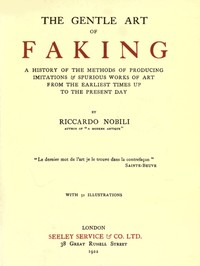The Gentle Art of Faking by Riccardo Nobili
Read now or download (free!)
| Choose how to read this book | Url | Size | ||||
|---|---|---|---|---|---|---|
| Read online (web) | https://www.gutenberg.org/ebooks/53638.html.images | 742 kB | ||||
| EPUB3 (E-readers incl. Send-to-Kindle) | https://www.gutenberg.org/ebooks/53638.epub3.images | 2.2 MB | ||||
| EPUB (older E-readers) | https://www.gutenberg.org/ebooks/53638.epub.images | 2.2 MB | ||||
| EPUB (no images, older E-readers) | https://www.gutenberg.org/ebooks/53638.epub.noimages | 368 kB | ||||
| Kindle | https://www.gutenberg.org/ebooks/53638.kf8.images | 2.4 MB | ||||
| older Kindles | https://www.gutenberg.org/ebooks/53638.kindle.images | 2.3 MB | ||||
| Plain Text UTF-8 | https://www.gutenberg.org/ebooks/53638.txt.utf-8 | 632 kB | ||||
| Download HTML (zip) | https://www.gutenberg.org/cache/epub/53638/pg53638-h.zip | 2.1 MB | ||||
| There may be more files related to this item. | ||||||
About this eBook
| Author | Nobili, Riccardo, 1859-1939 |
|---|---|
| LoC No. | 22006131 |
| Title |
The Gentle Art of Faking A history of the methods of producing imitations & spurious works of art from the earliest times up to the present day |
| Note | Reading ease score: 50.3 (10th to 12th grade). Somewhat difficult to read. |
| Credits |
Produced by Turgut Dincer, Charlie Howard, and the Online Distributed Proofreading Team at http://www.pgdp.net (This file was produced from images generously made available by The Internet Archive) |
| Summary | "The Gentle Art of Faking" by Riccardo Nobili is a historical account written in the early 20th century. The book explores the fascinating world of art forgery and imitation throughout history, looking at the methods and motivations behind the production of spurious artworks. It delves into societal factors, ethical distinctions, and the roles of collectors, dealers, and forgers in the art market, aiming to provide a comprehensive understanding of this unique aspect of human creativity and culture. At the start of the work, the author introduces the concept of "collectomania" and outlines the complex relationships between art collectors, dealers, and forgers, emphasizing the motivations that drive individuals to produce forgeries rather than genuine works. Nobili distinguishes the "faker" from mere forgers, suggesting that the faking of art has deep historical roots intertwined with ancient cultures, particularly focusing on the evolution of art collection in Greece and Rome. As the narrative unfolds, it sets the stage for discussions about the nature of imitation, the pressures of fashion on the art market, and the ethical implications of deception in the world of art. (This is an automatically generated summary.) |
| Language | English |
| LoC Class | N: Fine Arts |
| Subject | Collectors and collecting |
| Subject | Art -- Forgeries |
| Subject | Forgery of antiquities |
| Category | Text |
| EBook-No. | 53638 |
| Release Date | Nov 30, 2016 |
| Copyright Status | Public domain in the USA. |
| Downloads | 368 downloads in the last 30 days. |
| Project Gutenberg eBooks are always free! | |

